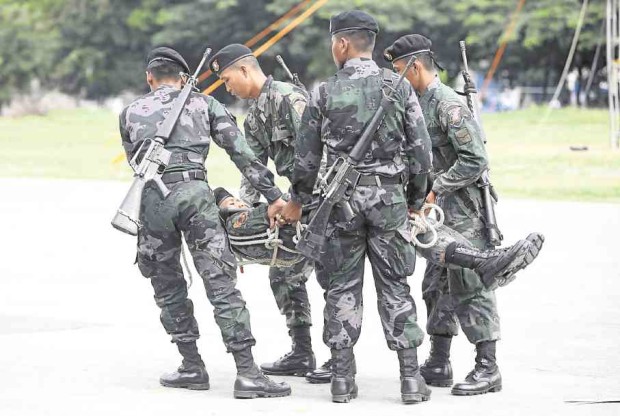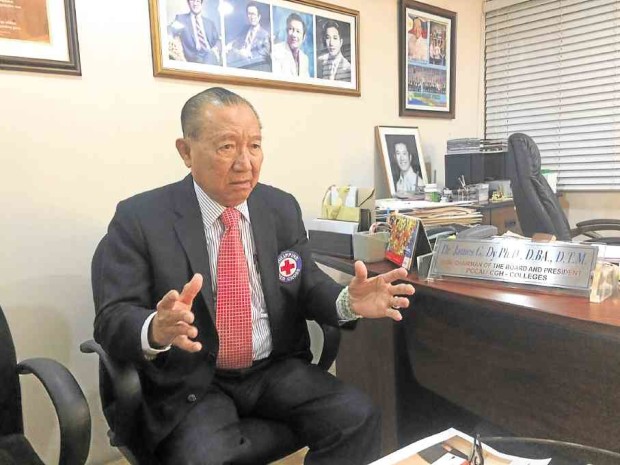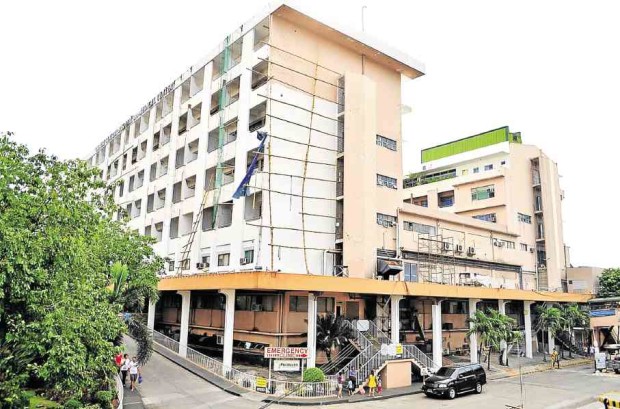For wounded cops, a Tsinoy healer renews commitment

As the PNP cites its own losses in the Duterte administration’s drug war, an organization that runs the Chinese General Hospital in Manila revitalizes a humanitarian program for law enforcers. —JOAN BONDOC
In 2014, PO2 Randolf Olivar and his buddy PO2 Archie Evangelista of the Quezon City Police District’s Station 10 were on a hunt for drug suspects in Barangay San Roque when they were met with gunfire in a dark, narrow alley.
Olivar was hit in the legs while Evangelista was shot in one foot and the side of the body.
The two were added to the long list of officers who had received free treatment at Chinese General Hospital and Medical Center, which for the last 28 years had been a silent healer and enabler of law enforcers.
Last month, the Philippine-Chinese Charitable Association Inc. (PCCAI)—the owner and co-operator of the hospital located in Sta. Cruz, Manila—renewed its partnership with the Philippine National Police that extends comprehensive medical assistance to officers wounded in action.
Established by Chinese immigrants and with roots dating back to the Spanish colonial period, PCCAI in the late 1980s channeled its philanthropy to low-income government workers.
All the more necessary
One particular sector drew its attention. “I saw at the time that our police are exposed to danger [yet] they received a very meager salary. If they were shot and could not get proper medical attention, they would surely die. Our government hospitals were not fully equipped, so it was better to send them to a hospital with high-tech and complete facilities and good doctors,” said Dr. James Dy, PCCAI president and chief executive officer.
“In this time of an intensified war on illegal drugs, they need this all the more,” Dy said when asked about his views on the PNP being under increasing scrutiny for being the spearhead of the Duterte administration’s deadly antidrug campaign.
“We need to boost their morale and support them so they also have the chance to live,” he added in a recent Inquirer interview.
“People have stopped trusting the police. When they fight drug lords, pushers and syndicates, now they need not worry. They know they will be healed and saved.”
Since President Duterte assumed office on June 30, 16 policemen had been killed in action and 45 had been wounded, according to PNP figures as of Nov. 25.
Waived hospital fees
According to the renewed agreement with the PNP, all policemen nationwide who were wounded in the performance of their duty will receive free hospitalization at Chinese General.
Those who contracted diseases—like skin cancer, in the case of traffic officers—could be accorded this privilege on a case by case basis as determined by the hospital’s assessment team.
Not covered by the agreement are wounds or injuries brought about by altercations, misconduct, immoral or illegal acts, and other factors not related to the police duty.
All of the hospital’s equipment and facilities are available for their use, and those who first received emergency treatment in other hospitals can be transferred to Chinese General. If they are coming from the provinces, they can be flown to Manila as the hospital has its own helipad, Dy said.
PCCAI has been a helping hand to the PNP since 1988. It has since forged similar partnerships with various fire brigades, the Metropolitan Manila Development Authority, the Manila Traffic Bureau, the Army Scout Rangers and the Prosecutors League of the Philippines, he added.
Lighter burden
Olivar, the Quezon City policeman wounded in 2014, remains grateful to PCCAI to this day. “”After risking our lives, we still have that burden of paying for our treatment. Now that burden is made lighter. In my case, I didn’t have to worry that much when I underwent an operation.”
Spouses SPO2 Jehrom and SPO2 Julie Jalla, who were both wounded when they foiled a robbery on their way home in Tayuman, Manila, in 2012, said that without PCCAI’s help “we would just be relying on PNP’s assistance and later survive on loans.”
The couple were then reporting to the Northern Police District when they encountered the armed robbers. Jherom was shot in the arm while Jullie, who was two months pregnant, took a shot in the body.
“We are very fortunate that there is an institution that supports the things we are fighting for,” said Jherom, who no longer had to pay their hospital bills amounting to about P200,000.
For their bravery, the Jallas received the Medalya ng Kabayanihan (Distinguished Conduct Medal), plus P20,000 in financial assistance from the PNP.
















